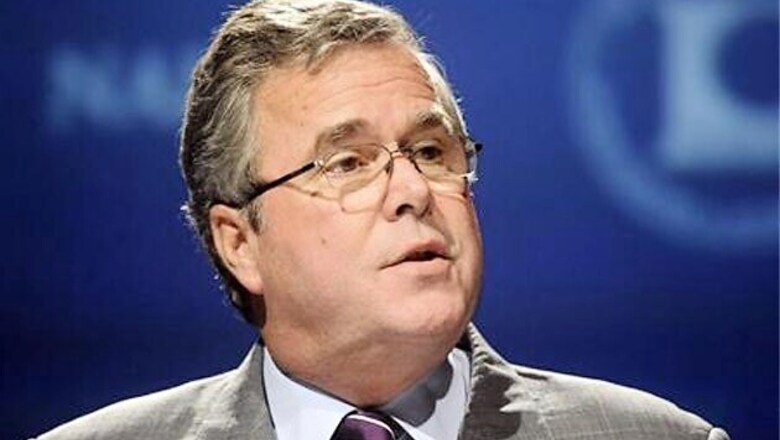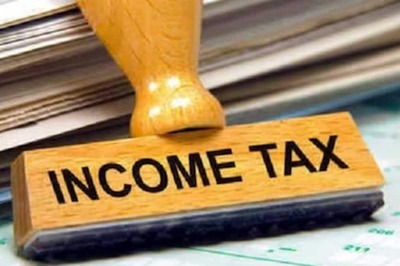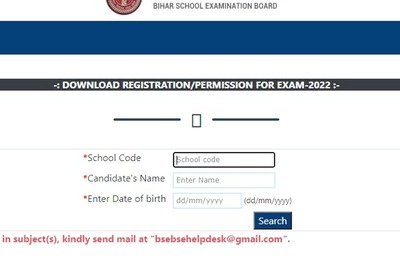
views
Miami: He's the non-candidate they never stop talking about.
Ever since Jeb Bush left the Florida governor's mansion in 2007 with favourable ratings after two terms, speculation has swirled about his political future.
The chatter has only gotten louder this year amid the Republican Party's "veepstakes" - despite Bush's repeated insistence that he is not in the running.
Bush appeared to put the issue to rest in a recent series of interviews with various media outlets in which he criticised the direction of the Republican Party and said that both his father, George HW Bush, and Ronald Reagan would "have a hard time" getting along with the party today.
When he said he supported a modest tax increase along with spending cuts to help reduce the federal debt, Bush joked, "This will prove I'm not running for anything." Former Massachusetts Governor Mitt Romney, the presumed Republican presidential nominee, and the party leadership oppose any and all tax hikes.
Comments like these have only fueled speculation that Bush is positioning himself to run for president - in 2016. According to this scenario, his breaking with the party on issues such as taxes is meant to stake out a platform that will move it back to the moderate centre and away from more divisive social issues, while also seeking more common ground on issues such as education and immigration.
The best argument for doing that, of course, would be if Romney, running on more conservative positions, fails to unseat President Barack Obama this year.
"Jeb Bush is following a pattern we see with ambitious presidential candidates," said Jamie Chandler, a political scientist at Hunter College, New York. "Just like Romney did in 2004, he's raising his public profile and increasing his speech activity now for a potential run in four years."
If Romney wins, Bush would be a likely Cabinet candidate, perhaps as education secretary, said Chandler. But any presidential ambitions would have to wait until 2020. By then he would be almost 68, just a year younger than Reagan in 1990, the oldest US president to be sworn into office.
Not everyone is convinced Bush has such a game plan. Some of the people who know him best say he is not that calculating. They say he is speaking out because he is deeply loyal to the Republican Party and worried about the issues he holds dear.
"It's more about helping the cause than helping himself. He will always call it the way he sees it," said Jorge Arrizurietta, a top Republican fundraiser in Miami and a former adviser to Jeb Bush. "I can't tell you that he's got a master plan, but there is a broad consensus in the party that Jeb should stay involved and consider a run at the right moment."
Bush declined to be interviewed for this article, citing a busy schedule, including a speech on Thursday in Orlando to the National Association of Latino Elected Officials where he received a rapturous reception.
Speaking at the same event, Romney got a noticeably less enthusiastic welcome, though he softened his stance on immigration, appearing to borrow from Bush's advocacy for a more compassionate position toward the nation's 11 million undocumented aliens.
A Conservative leader on education
Bush's conservative record in government gives him more "flexibility" to speak freely, said Larry Sabato, director of the Center for Politics at the University of Virginia. "He's got a record that's appealed to the base. That overrides any apostasy on the campaign trail."
Bush secured his bona fides with social conservatives in 2003 with his controversial order to reinsert the feeding tube of Terri Schiavo, a brain-injured woman who had been in a coma for 15 years. The family was divided over whether to keep her alive, but right-to-life activists pushed the matter all the way to the US Supreme Court.
Bush made his biggest mark as governor in education policy, securing a number of reforms with a conservative slant. He signed a measure giving public schools an annual grade based on student test scores and rewarded them with state funds accordingly.
He encouraged charter schools, which are publicly funded but typically run by private corporations, and instituted a statewide voucher programme - later struck down by the state Supreme Court - that let hundreds of students in failing public schools enroll in private and religious schools at taxpayer expense.
The state has posted strong growth in reading and math scores, according to recent federal data, with most of the gains coming during the Bush administration.
The website run by his Foundation for Excellence in Education calls his education record as governor "perhaps the greatest public policy success story of the past decade."
Yet a close look at that record suggests a key ingredient of his programme was one the party faithful might not be keen to embrace: a huge increase in state spending on education.
Bush had the good luck to govern in the years before the economic crisis and the home mortgage debacle devastated Florida. During his administration, average state funding per student rose from $5,000 in the 2000-01 school year to $7,126 in the 2007-08 school year.
He spent tens of millions training teachers, sending reading coaches to elementary schools and creating summer reading camps.
At home in Miami
Raised in Texas, Bush attended the prestigious Andover boarding school in Massachusetts before he went to the University of Texas at Austin, where he graduated with a degree in Latin American Studies.
The large public university in Texas may have been a better fit for Bush than an east coast Ivy League school, such as Yale, where his father and older brother, George W Bush, studied.
"Jeb doesn't feel as comfortable in that kind of New England patrician environment," says Roberto Martinez, the former US attorney for Florida's southern district, who has known Bush since their days at Andover.
Bush met his wife, Columba, while teaching English in Leon, Mexico, and their three children were raised in a bilingual household.
Jeb was always regarded as the son most likely to carry the Bush brand into the next generation. In 1994, he was running for governor in Florida while brother George was running in Texas. Their parents flew to Miami on election night, expecting to celebrate Jeb's victory over Democrat Lawton Chiles. Jeb lost by a narrow margin, and his parents had to dash to Austin to mark George's upset of incumbent Governor Ann Richards.
By the time Jeb captured the Florida governorship in 1998, his brother was already eyeing a presidential run in 2000.
Friends say Jeb's attitude toward politics remains ambivalent, and that he prefers to remain above the fray. In 2007, he was happy to leave behind the often petty politics of Tallahassee and return to private business in Miami.
Before running for governor, Bush was involved in a number of entrepreneurial ventures in South Florida. Since leaving office he has dedicated himself to rebuilding his family finances, going into the real estate business with his son, Jeb Jr. He also has lucrative directorships on several corporate boards, including Tenet Healthcare, and has immersed himself in the two areas of policy he cares most about: education and immigration.
"Jeb wants to be a leader on the big issues of the day... Whether he's influencing the 2012 debate or the 2016 debate, or even 2020, that's not the question," said Chuck Cobb, a close friend of the Bush family and former undersecretary of commerce in the Reagan administration. "Does Jeb want to be a leader? Yes. Does Jeb have to be the leader of the United States to do that? I think not."
Have issues, will travel
His education work gives Bush a platform to proselytize fellow Republican lawmakers and governors. He has been to a dozen states over the past 15 months to promote the "Florida formula," in the process establishing a network that would serve him well in a national campaign.
Bush "has turned into a kind of Johnny Appleseed of education reform, carrying ideas around the country and planting them wherever he can," said Chester Finn Jr., an education policy analyst and president of the Thomas B Fordham Institute, an education think tank in Washington.
One of those ideas, which resonates with the party base, is to aggressively promote the idea that teachers unions are impediments to reform.
Education could be a way for Bush to build political coalitions, since the cause of improving America's schools crosses party lines.
Bush has praised current Education Secretary Arne Duncan for pushing reforms including more charter schools and more rigorous teacher evaluations. President Obama heaped praise on Bush during a joint appearance at a Miami high school last spring.
Lately, Bush has been heavily promoting virtual schools and online courses, which can save states money but have a mixed track record on student achievement.
Bush's foundation, which has made online learning a major focus of its work, gets much of its funding from companies and philanthropies tied to companies that would profit from expanded virtual schooling. Backers include online education companies Apex Learning, GlobalScholar and K12 Inc, and technology companies such as Apple, Intel and Microsoft.
That doesn't sit well with Bush's critics.
"So much money is spent on virtual schools that make his friends wealthy, while at the same time schools are having to eliminate art, music, P.E., guidance counselors, nurses, all in order to pay for all the tests" called for under Bush's education reform agenda, said Andy Ford, president of the Florida Education Association, a teachers union.
Latino advocate
Bush's passion for immigration reform might also get him in trouble.
"It would be incredibly stupid over the long haul to ignore the burgeoning Hispanic vote," he told the Hispanic Leadership Network conference in Miami last year, noting that failure to take Hispanics more into account was hurting the party.
Yet his support for educational opportunities for undocumented students could be a liability in some primary races.
Winning the party's nomination for president depends on "voters in primary states," says veteran Miami congresswoman Ileana Ros-Lehtinen, a Cuban-American Republican who hired Jeb Bush as her campaign manager for her first congressional bid in 1989. "There's no big structure that will anoint anyone. Romney had to win it fair and square in every primary, and Jeb will have to win it that way too."
Even though they have their differences, Bush has earned the respect of the Tea Party. "Jeb Bush is a very solid conservative and a likable guy. Many people like me wish he was president," says Florida Tea Party Chairman Everett Wilkinson, a Palm Beach County political consultant.
Some Democrats also admit to a sneaking regard for him. "I think he is the most dangerous Republican candidate," says Freddy Balsera, a public relations consultant in Miami and Hispanic adviser to the Obama campaign. "He's a real conservative who understands Latino voters better than even many Latino elected officials," he added.
Hispanic voters were deeply opposed to the war in Iraq and blame George W Bush for the recession. But by 2016 that may be less relevant.
Certainly, Jeb's family remains proud of the Bush brand. His granddaughter, born last year, was named Georgia HW Bush.
"I know that there's Bush fatigue right now, but I think Jeb can overcome that," says Ros-Lehtinen. "I hope that he runs for president. I think that's where he belongs."




















Comments
0 comment